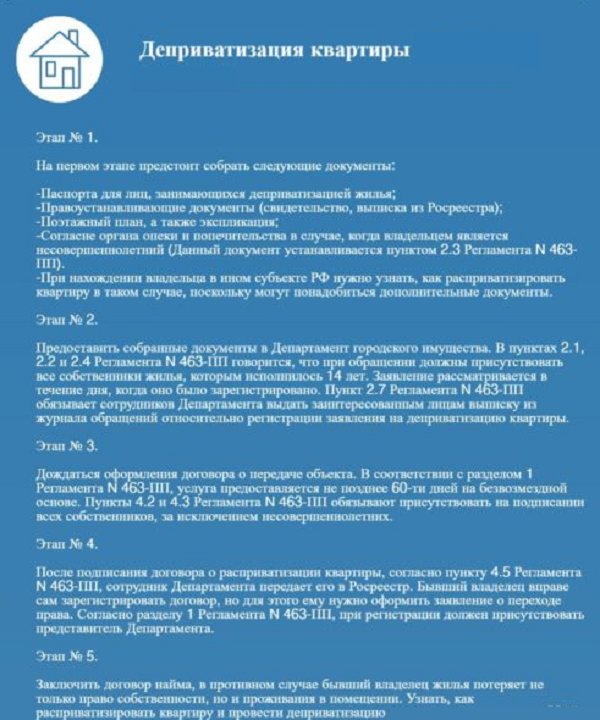When the privatization of housing was allowed at the legislative level, citizens began to do it en masse. So they got expensive property. Over time, some decided that they could not pay property taxes or were not satisfied with other aspects, then the question arose about whether it was possible to cancel the privatization of the apartment. This the procedure is provided legislation - article 9.1 of the Law “On Privatization”, and can be resorted to under certain circumstances.
When can privatization be cancelled?
Cancellation of privatization is available:
- On a voluntary basis , if a citizen needs it for any reason.
- The need for forced deprivatization arises if violations were committed . The basis for its holding is a court decision .
The owners may have
a voluntary desire
- The family grows and receives the right to receive a larger apartment, but the living space has already been privatized. Accordingly, people lose the opportunity to repeat the procedure. The abolition of apartment privatization will allow you to get on the waiting list for housing that complies with current housing standards.
- If the condition of the apartment is such that it requires expensive repairs, then its tenant can avoid expenses by transferring it to the public housing stock. He will lose ownership of it, but will save a significant amount of money.
- Those who live in a municipal apartment are exempt from paying tax on their housing. If the owner considers this burdensome for himself, he can carry out the procedure in question.
- Sometimes older people do not have good relationships with loved ones. If they do not want to transfer the apartment to them by inheritance, then it is enough to deprivatize it.
- Sometimes an elderly person has no heirs, and it is difficult for him to financially maintain his home. He can cancel privatization, creating more acceptable conditions for himself.
Reference! The procedure is regulated by Article 9.1 of the Law “On Privatization”. It states that municipal authorities are obliged to take the apartment under their jurisdiction. Having carried out the procedure under consideration, the owner loses the right to carry out privatization again on a general basis.
Deprivatization can also be carried out in a forced manner . reasons may exist for this :
Free legal consultation
+7 800 350-51-81
- During privatization, violations were committed that made it invalid.
- The contract was concluded under the influence of intimidation or physical violence or as a result of corresponding threats.
- Participants in the transaction were incapacitated persons. If their condition was hidden from officials, then this is a reason to cancel privatization.
- If registration was carried out without the participation of all registered persons.
- The transfer of the apartment into the ownership of the residents must be done in such a way that the rights of minors are not violated. If this rule is violated, then the entire procedure becomes invalid.
Attention! Forced cancellation of the procedure can only occur by court decision. Victims, as well as representatives of certain government bodies: the prosecutor's office, guardianship and trusteeship, or social protection, can file a claim.
The grounds for deprivatization are listed in Article 178 of the Civil Code of the Russian Federation.
How to cancel the privatization of an apartment
Exiting the privatization of an apartment is not so difficult. It is enough to provide compelling arguments and send a request to the government authority. If there are no obstacles, it will be possible to cancel the privatization without a trial. The presence of complications and disputes between residents requires challenge in court. Let's consider both options.
Procedure
The voluntary procedure for abandoning a privatized apartment is the most common. The authorities do not create obstacles, but they may delay the procedure.
Step-by-step algorithm of actions (voluntary):
- Preparation of an application for deprivatization.
- Transfer of documents to the local administration.
- Waiting for a response from the municipality.
- Signing an agreement to return the apartment back to the state.
- Making changes to Rosreestr.
- Conclusion of a new social rental agreement for residential premises.
Identification of serious violations in the privatization process obliges the parties to go to court. This is the only way to invalidate the procedure. If you challenge the privatization of an apartment in court, then residents will be able to take advantage of the chance for free privatization again. Provided that violations actually took place.
Procedure (through court):
- Conduct pre-trial negotiations with the opposing party.
- Prepare a package of documents.
- Draw up a statement of claim for deprivatization.
- Pay the state fee.
- Give the package to the secretary of the office.
- Attend preliminary and main hearings.
- Obtain a court order.
- Contact the administration and cancel the privatization of the apartment.
- Record changes in Rosreestr.
- Re-sign the social rental agreement.
Participation in court hearings requires certain skill and legal knowledge. It is quite difficult to cope with the work alone. We offer you a free legal consultation. Our consultants will tell you when to deprivatize an apartment through the court and what to focus on when protecting your interests?
Procedure, process
The sequence of actions to cancel the privatization of an apartment depends on the chosen method: deprivatization (voluntary) or deprivatization (forced). Some steps are the same, so let's describe the general structure.
How to cancel the privatization of an apartment (step by step):
- Stage No. 1
The first step is to obtain the consent of all residents of the apartment. Deprivatization, like privatization, is a voluntary event. Consents are expressed in person and in writing. Then they are formed into a single package. If one of the residents refuses, the housing will have to be deprivatized in court.
- Stage No. 2
Contacting the local administration that issued the privatization permit. You will be given a receipt confirming receipt of the documents. The presence of all residents is not necessary - it is enough to choose one representative. Do not forget that in this case you will need a power of attorney.
- Stage No. 3
Signing an agreement on deprivatization of the apartment. The property will be returned to the municipality and will become available for living (if it is not dilapidated or dilapidated housing). The agreement is signed by all participants in the procedure.
- Stage No. 4
The final stage will be the conclusion of a new social rental agreement. Not necessarily for the transferred apartment - you can move into another housing if the municipality has free living space.
Expert opinion
Dmitry Nosikov
Lawyer. Specialization: family and housing law.
Often the parties have mutual claims - then it is necessary to go to court, where the apartment owners will cancel the privatization agreement. For example, in case of violation of the interests of a child or illegal retention of shares in an apartment. The initiator of a challenge in court can be any of the residents, and in some cases the guardianship authority or the administration (see “Deprivatization of an apartment, housing”).
Procedure for canceling privatization
The rules on how to cancel the privatization of an apartment suggest that the owners take the following steps:
- Collect a package of necessary papers . Usually, these are the same documents as for privatization. You will need: an application, a passport, a birth certificate (for those who do not have one), a certificate from Rosreestr confirming the absence of encumbrances on the apartment, a technical passport, an apartment card, a document confirming the absence of arrears in payment of utilities, a receipt confirming the fact of payment of state duties.
- The package of documents is handed over to representatives of municipal authorities . After review, written notification is given of the decision.
- After a positive decision a social tenancy agreement within two months .
All residents must present identification documents. A technical passport must be obtained by contacting the BTI.
After completing all stages of registration, the transfer of residential real estate to state ownership will be completed.
The application is completed as follows:
- In the upper right part of the document you need to indicate which municipal authority the application is being addressed to.
- Next they write from whom the application is being drawn up. Here they indicate the last name, first name, patronymic, residential address and contact information (telephone number) of the citizen.
- Then indicate the type of document (“Application”).
- The main text is the formulation of the request for re-privatization. In this case, indicate the type of residential premises, address, and privatization certificate number. The applicant asks to conclude a social rental agreement with him and other residents of the apartment.
- Below is a list of additional documents attached to the application. There must be indicated the date and number of the privatization certificate, a certificate stating that there are no encumbrances on this housing. If necessary, a document from the guardianship authorities must be included. It is necessary when re-registration of children is carried out.
- At the bottom of the sheet they put the date of the document, as well as the signatures of all owners and family members.
When submitting a package of documents to municipal authorities, it is recommended to complete the registration in two copies . One of them is submitted for consideration, on the second a mark is placed indicating when and under what incoming number the first copy was accepted.

Heavy expenses
The owner bears the full burden of expenses for his property. When there was a surge in privatization, few would have thought that in 20–25 years having your own home would become an expensive pleasure. Just look at the sharp increase in taxes in recent years, when the tax base began to be considered the cadastral value of an apartment, as close as possible to the market value. Because of this, in many regions the amount of tax has increased tenfold, and this is not the limit. For example, previously they paid an average of 500–600 rubles in tax for a standard one-room apartment in Moscow, but now on average you have to pay 5,000–7,000 rubles.
In addition to taxes, fees for major repairs are added, which only the owner pays. This is another 6,000–10,000 rubles per year.
Utilities are usually cheaper in apartments where residents live under a social tenancy agreement, since fees for maintenance and repairs of residential premises are set based on municipal tariffs, and owners may be subject to inflated tariffs established at a general meeting of homeowners.
If the meters break down, the battery leaks, etc., the administration will be required to correct the deficiencies. The administration is obliged to install meters, and also bear all the costs of maintaining these meters, including paying for the verification of metering devices. If the apartment is privatized, then all these costs fall on the owner.
Thus, you can save 20,000 rubles or more per year; it is not surprising that the deprivatization of an apartment has begun to arouse such interest.
Cost and terms
Refusal from privatization is a free procedure . Costs may be associated with the required paperwork . For example, the cost of an extract from the Unified State Register is 460 rubles.
The time for reviewing documents should not exceed 30 days from the date of submission. Forced cancellation of the privatization of an apartment through the court requires payment of a state fee in the amount of 300 rubles .
Reasons for canceling apartment privatization
Cancellation of privatization, that is, termination of the contract, is not a complicated process.
But any action must have a basis:
- Difficult financial situation
- Personal wish
- If a citizen reveals some violations during privatization
- If a citizen does not agree with the distribution of shares
- If the rights of young children have been violated
- Fraudulent activities
- Forgery of documents
- If one of the applicants for housing is incapacitated
- If the living space has been rebuilt and the changes have not been made to the relevant documentation and not approved by the BTI
- Full technical condition of the premises
Let's celebrate! If any violations are identified, and their presence does not allow one to abandon privatization voluntarily, then such issues are resolved in the courts. Let's consider both scenarios.
Is it possible to cancel the privatization of part of the housing?
One of the legal requirements for carrying out the procedure in question is the consent of all apartment owners. If at least one of them has not issued a permit, deprivatization cannot be carried out.
Important! An exception is the design of a room in a communal apartment. It is privatized and deprivatized separately, regardless of the rest of the living space. The procedure is carried out only if the room was previously allocated to separate housing.
Consequences of canceling apartment privatization
There is no law to abolish the privatization of housing. When drawing up a claim, you should be guided by the norms: Law 1541-1; Housing complex of the Russian Federation; Civil Code of the Russian Federation; regional and municipal acts. The validity period of the right to privatization was established by Federal Law No. 14 of February 22, 2017.
According to this act, privatization has become unlimited and, thus, the question does not arise what will happen after missing the deadline for the validity of the right, established back in 2021. You should be aware of the deadlines for filing a claim.
Let's celebrate! It is general and lasts 3 years from the moment the interested person learned about the violation of his rights. The consequences of canceling privatization include the consequences of declaring the transaction invalid. It is possible to restore the validity of the social tenancy agreement and move into the disputed living space.
Reasons for refusal
The state does not always approve of the refusal to privatize. Its reasons may be the following:
- Among the owners there is a minor .
- If utilities not been paid in full at the time of application .
- When among the owners at least one person refused to agree to refuse privatization.
- If there is an encumbrance on real estate. For example, when an apartment is used as bank collateral when obtaining a loan.
- When at least one of the owners owns another property or its share.
- The procedure is carried out only if the right to property for all owners has been obtained through privatization (this also applies to official housing). If at least one of them received the property upon purchase, as an inheritance or in another similar way, deprivatization will not be carried out.
- Sometimes residents carry out redevelopment . official permission has not been received for it , then such an apartment cannot be deprivatized.
- When occupied by new registered persons who have not previously participated in the privatization of this apartment.
Reference! If the refusal was unlawful, the citizen can defend his rights in court.
In order to be able to cancel the privatization of an apartment by court , you need to perform the following actions :
- File a legal claim.
- Prepare those documents that confirm the position of the plaintiff.
- Contact a court of general jurisdiction.
- After receiving the summons, you must attend court hearings and participate in the proceedings.
- Receive a written court decision.
- If it was not positive, an appeal is carried out.
- A decision confirming the plaintiff’s position is the basis for the deprivatization procedure. You need to write an application for the procedure based on the received document and submit it to the municipal authorities.
Based on a court decision, local authorities are obliged to make a positive decision to cancel the previously carried out privatization.
The statement of claim is written as follows:
- It is necessary to indicate to which judicial authority the appeal is being made.
- The plaintiff writes his last name, first name, patronymic, and registration address. You must provide a contact phone number where you can contact him.
- The respondent's details are required. Usually we are talking about the municipal authority that made the decision to refuse.
- Write the title of the document.
- The main part of the document begins with a story about the grounds for privatization, the date of its implementation, and the persons who participated.
- It is necessary to describe in detail the violations committed by the government agency and provide the grounds for a judicial resolution of the issue.
- Claims are formulated and must be properly substantiated.
- A list of those persons who are recommended to be invited to the court hearing is indicated.
- A list of documents attached to substantiate the claim is provided.
The date of preparation of the document, as well as the signature must be indicated .
Cancellation of apartment privatization through court
If the statute of limitations has not expired, which is three years, then privatization can be canceled through the courts.
If a citizen encounters certain difficulties, it is better to contact a qualified specialist. But in fact, there is nothing supernatural in drawing up a statement of claim and filing it with the court.
Let's celebrate! If the court rules in favor of the plaintiff, then the process of canceling privatization is considered completed. The court seizes the residential premises so that while the housing is in limbo, fraudsters will not take advantage of it. We will discuss the procedure in more detail below.
Procedure
Before submitting the necessary documentation with the claim to the judicial authorities, it is necessary to meet with the opposite party pre-trial and discuss the nuances. As often happens, sometimes a compromise is found before filing an application.
If this does not happen, then the citizen:
- Prepares documentation for the court
- Draws up a claim
- Pays state duty
- The finished package of documentation is transferred to the secretariat of the court
- Waiting for hearing
- Trial
- Judgment
- Recording changes in Rosreestr
- Conclusion of a new social tenancy agreement
Statement of claim
The claim is drawn up in a certain form. Any violations of this rule or inaccuracies will lead to the citizen being denied registration of a claim and trial will be impossible.
What information does the claim contain?
When drawing up claim documentation, corrections, cross-outs and abbreviations are prohibited.
All data is recorded accurately and must not contain false information:
- Court address
- Personal information of the plaintiff and defendant
- Grounds for application
- The reason why the citizen went to court is stated
- Evidence that the plaintiff is right
- Documentation that proves it is correct
- Date of application
- Plaintiff's signature
Required documents
Preparation of documents is necessary, no matter what the reason for filing the application. Any mistake will result in the claim being thrown out before it even gets to the judge's desk. Every citizen must remember that all original documents must be supported by copies.
It is better that these copies are in several copies. The documentation must contain data from all participants in the process.
If the entire family and, most importantly, small children are registered in the living space, their documents are also necessary:
- Passports
- Birth certificates
- Privatization agreement
- Extract from Rosester
- Help from the Housing Office
- Statement
- If small children are involved in the process, then there must be a document that gives the consent of the guardianship and trusteeship authorities to complete the transaction
- Certificate of people registered in the living space
- A document stating that all housing taxes have been paid
- Additional Documentation
Timing and cost
The deadline for submitting an application is 1 month. If everything is in order with the documentation, then the citizen will receive a document stating that the apartment again belongs to the state the very next day.
This happens during the voluntary delivery of privatized housing. If we talk about forced termination of the contract, then this process will take up to 3-4 months.
The costs are:
- Extract from Rosreestr – 200 rubles
- State fee for filing an application – 300 rubles
- If a person turns to a specialist, there will be additional costs
Reasons for refusal to deprivatize housing
There are many reasons. And each can lead to the fact that judicial or government authorities refuse to deprivatize living space:
- If this property is inherited
- The apartment was purchased under an exchange or purchase agreement
- The living space has encumbrances
- If after privatization there are registered citizens
- If the property is shared and one of the owners is against
- Debts to the housing office or tax authorities
- Housing should not be demolished
- If the citizen still has housing
- If small children and guardianship authorities are involved in the process, these actions are against
Note! It is not uncommon for an apartment that they want to return to state ownership to belong to several owners. In this case, the return will only be possible with the consent of all share owners. Parts of the apartment cannot be returned. If someone is against, then such issues are considered only in court.
Didn't find the answer to your question? Find out how to solve exactly your problem - call right now: +7 (Moscow) +7 (812) 309-53-42 (St. Petersburg) It's fast and free!
Documentation
When submitting an application, you must attach the following package of documents:
- Passport of a citizen of the Russian Federation.
- For children under 14 years of age who do not have a passport, a birth certificate is required.
- If children are registered in the apartment, permission from the guardianship authorities for deprivatization will be required. Unlike privatization, it will be difficult to obtain such a document, since it implies the child’s loss of ownership of the property, which is clearly not in his interests. You will have to argue your position in great detail and in detail.
- Extract from the Unified State Register (USRN) (can be obtained from Rosreestr or through the MFC).
- Consent from all owners to deprivatization.
- Statement of account confirming the absence of debt.
- A certificate from the tax office stating that all property taxes have been paid in full.
Additional documents may be required in some regions. For example, a previous social rental or privatization agreement, BTI registration certificate, and so on.









